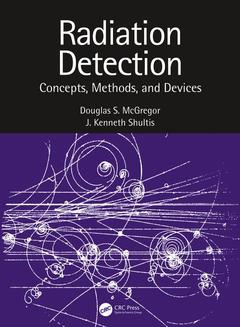Radiation Detection Concepts, Methods, and Devices
Auteurs : McGregor Douglas, Shultis J. Kenneth

Radiation Detection: Concepts, Methods, and Devices provides a modern overview of radiation detection devices and radiation measurement methods. The book topics have been selected on the basis of the authors? many years of experience designing radiation detectors and teaching radiation detection and measurement in a classroom environment.
This book is designed to give the reader more than a glimpse at radiation detection devices and a few packaged equations. Rather it seeks to provide an understanding that allows the reader to choose the appropriate detection technology for a particular application, to design detectors, and to competently perform radiation measurements. The authors describe assumptions used to derive frequently encountered equations used in radiation detection and measurement, thereby providing insight when and when not to apply the many approaches used in different aspects of radiation detection. Detailed in many of the chapters are specific aspects of radiation detectors, including comprehensive reviews of the historical development and current state of each topic. Such a review necessarily entails citations to many of the important discoveries, providing a resource to find quickly additional and more detailed information.
This book generally has five main themes:
- Physics and Electrostatics needed to Design Radiation Detectors
- Properties and Design of Common Radiation Detectors
- Description and Modeling of the Different Types of Radiation Detectors
- Radiation Measurements and Subsequent Analysis
- Introductory Electronics Used for Radiation Detectors
Topics covered include atomic and nuclear physics, radiation interactions, sources of radiation, and background radiation. Detector operation is addressed with chapters on radiation counting statistics, radiation source and detector effects, electrostatics for signal generation, solid-state and semiconductor physics, background radiations, and radiation counting and spectroscopy. Detectors for gamma-rays, charged-particles, and neutrons are detailed in chapters on gas-filled, scintillator, semiconductor, thermoluminescence and optically stimulated luminescence, photographic film, and a variety of other detection devices.
Douglas S. McGregor is a University Distinguished Professor in Kansas State University (KSU) and holds the Boyd D. Brainard Chair in Mechanical and Nuclear Engineering. Professor McGregor serves as director of the Semiconductor Materials and Radiological Technologies Laboratory at KSU, a 9500 sq ft laboratory dedicated to radiation detector research.He has published over 200 research articles and reports, is co-inventor on over 20 radiation detector patents, and his research group has received five R&D-100 Awards for radiation detector innovations. Prof. McGregor is also the recipient of various other honors, including the KSU College of Engineering (CoE) Frankenhoff Outstanding Research Award (2006) and the CoE Engineering Distinguished Researcher Award (2016).
J. Kenneth Shultis joined the Nuclear Engineering faculty at Kansas State University in 1969 and where he presently holds the Black and Veatch Distinguished Professorship and is the Ike and Letty Conerstone teaching scholar.Besides being coauthor of this book he has coauthored the books Fundamentals of Nuclear Science and Engineering, Radiation Shielding, Radiological Assessment, Principles of Radiation Shielding, and Exploring Monte Carlo Methods.He is a Fellow of the American Nuclear Society (ANS), and has received many awards for his teaching and research, including the infrequently awarded ANS Rockwell Lifetime Achievement Award for his contributions over 50 years to the practice of radiation shielding.
Date de parution : 09-2020
21x28 cm
Thèmes de Radiation Detection :
Mots-clés :
Alpha Particle; radiation measurement; Electron Ion Pairs; radiation detection; Beta Particles; photographic film; Pulse Height Spectrum; fluorescing barium-coated plates; Pulse Height; Proportional Counters; UV Photon; Organic Scintillator; Gamma Ray; Host Gas; Ion Chamber; Anode Wire; Differential Scattering Cross Section; Quench Gas; Decay Constant; FWHM Energy Resolution; Gamma Ray Spectrometer; Count Rate; Semiconductor Detectors; Fission Fragments; Radiation Detector; PSD; Thermal Neutron; HCPs; Gamma Ray Detection


